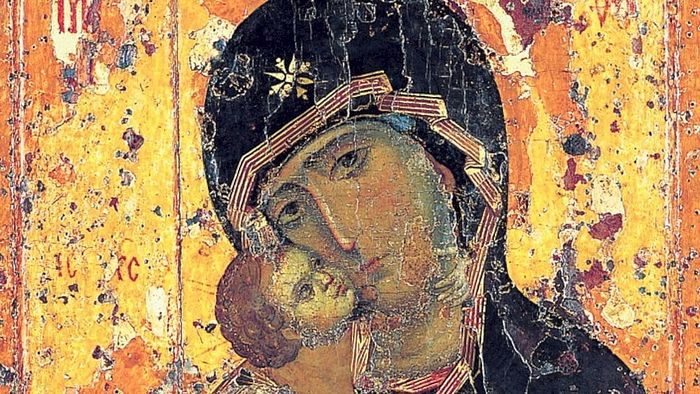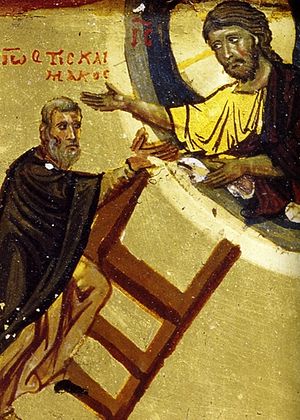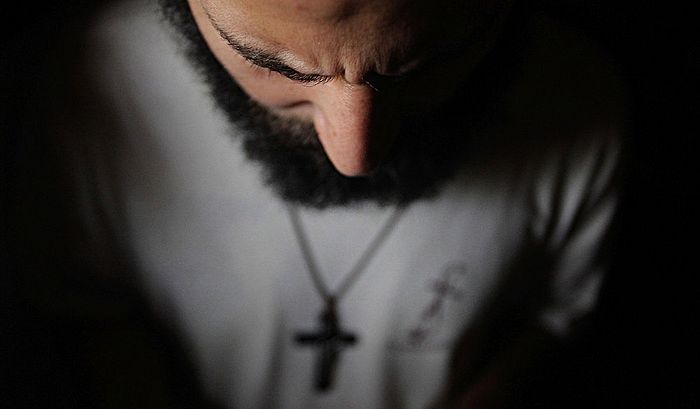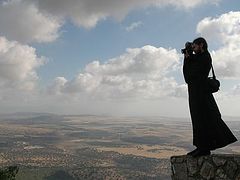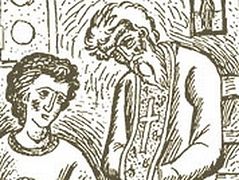Part 3. Day to Day Spiritual Life
Several years ago Fr. Alexey Young (now Hieroschemamonk Ambrose) gave a parish retreat entitled “Orthodox Spirituality” which was turned into a six-part VHS series produced by Christian Activist Productions. Fr. Alexey was a spiritual child of Fr. Seraphim Rose, and, as these videos attest, acquired his talent for synthesizing the Patristic Tradition and communicating deep subjects in easy-to-understand language. As the videos are in a format that cannot be posted we will be posting articles, with Fr. Ambrose’s blessing, based on notes on the videos, throughout the Apostles' Fast in honor of the saints who have become masters of spirituality while yet in their earthly lives.
In this fourth part Fr. Alexey gives deep but practical advice on how to know and repent of our vices, filling their spots in our hearts with virtue. In this the saints are our inspiring guides and examples, none possessing greater virtues than the Most Holy Theotokos, whose Vladimir Icon we commemorate today.
We often wonder how often we should go to confession. The answer is simple—whenever you have a serious sin on your conscience. Examine your conscience and beg God to show you’re your faults; if you don’t know who you are then you don’t know what Christ came to save you from. This can be a difficult process, but a necessary one. Such study reveals our self-love by which we blind and deceive ourselves.
Our sins offend the Almighty God. He wants to forgive us and share His mercy. We must be satisfied not just with avoiding serious sins, but even the smallest, in an ongoing striving for holiness. Our sins cause ourselves and others unhappiness—why would we want this?!
St. John of Kronstadt says that if you live just one day in obedience to all the commandments then you’ll have a foretaste of Heaven. Once we know and detest our faults we can begin to replace them with virtues, but know that this won’t happen all at once. Be the simple, difficult, weak creature that you are, and start small—to try to stop sinning all at once is actually a manifestation of pride. Start with the baby milk of spiritual struggle before moving on to the strong wine.
How should we examine our conscience? You should do this daily, taking time at night to reflect. You can use the Ten Commandments, the Beatitudes, and so on, as a guide. My spiritual father, Fr. Seraphim Rose, taught me to consider: How have I sinned against God? against my neighbor? and against myself?
Through examining our conscience we begin to discover what is our predominant passion(s)—that sin we fall into most frequently, which tries to master us. This can be the love of ease, love of power, complaining, judgmentalism, and so on. One of the worst things that can happen to us if when someone asks our advice, so we give “learned advice,” but in the end they don’t follow it and we get very upset.
To overcome vice we must practice the opposing virtue. The Ladder of Divine Ascent is a great help in this regard. St. John Climacus analyzed each virtue and vice as a master of psychology, seeing cause-effect relationships in a theocentric framework. Identify your predominant vice, locate its opposite virtue and begin to cultivate it. Simply avoiding vice won’t work because then the passion will simply be replaced with other passions. If we do this we will see that the spiritual life works! We don’t like anyone to point out our faults, but in actuality we need our spiritual father to do this.
We each have our predominant virtue too. Studying and practicing this tends to draw the other virtues along with it. We can overcome vice by practicing the presence of God, by beginning to develop an awareness that at all times we are in the presence of God and He observes us. The icon corner serves this purpose. It is a two-way window to Heaven. Before doing or saying anything, think to yourself: “Would I do this in Church in front of the altar?” If the answer is “no” then don’t do it. Church is the place par excellence where we come into God’s presence and receive Him.
The Theotokos practiced the presence of God more perfectly than anyone else. Her virtues grew and she thus had a powerful influence on other people. People were made better by her mere presence.
The predominant passion is pride; it is the mother of all sins. Its opposite is humility. No soul can have any holiness without some humility, and yet pride will lurk in our darkest recesses our whole life. Adam and Eve fell because they listened to the serpent and thought that they knew better than God. This is pride, and now most of us follow two masters—a little pride and a little humility. Pride is the love of self, the beginning of all sin, and the neglect of the fact that we depend on God for everything.
What separates us from death is so little. Our lives are very fragile, and pride places us in opposition to God because by it we work only for our own glory.
Pride places false regard on the opinion of others, and of ourselves, when the what you think matters more than what God thinks. It is also manifested as desiring a good reputation—to be thought well of, to be honored—and this is a great temptation for priests, with people looking for the latest guide or guru. A priest must do everything to remain humble about what people say. Actually, criticism against a priest is a blessing to keep him humble, which is in turn good for the whole parish. Pride is also seen in being overbearing towards others, insulting or critiquing others, being argumentative, and getting angry easily.
The holy Fathers give us the antidote for going from vice to virtue. The spiritual life is a science, not an art form. Most of us aren’t so spiritually talented so we need laws and cause and effect in order to learn the spiritual life. St. John Climacus says that the antidote for pride is prayer. Identify where the pride is in your life and ask for strength against it. Human effort can do very little. We must realize that everything depends on God. In prayer we make use of God’s grace, and then we can do almost anything—we can move mountains!
Pride can also be turned into humility by acts of humility, and especially by accepting humiliations. If someone criticizes you, even unfairly, if someone insults you or talks about you behind your back, instead of becoming defensive, accept it! This cheerful bearing of small failures on the part of ourselves and others is bearing one another’s burdens (see Gal. 6:2). It is important to bear the misunderstandings of others without complaint or self-justification. All too often we’re prone to excuse ourselves and urge our opinions on others. When we learn to accept the humiliations that come our way then we’re learning to be humble. As pride is the mother of all sins, humility is the mother of all virtues.
Another serious vice is avarice, which is the opposite of detachment and denunciation. It is the desire for many goods, for power over people, and so on. This passion is combated by cultivating a spirit of generosity. The Lord’s command to give up your coat is quite literal (Mt. 5:40). St. John Maximovitch would often come back practically naked because he had given his clothes away to the poor and starving. St. John of Kronstadt did the same. You don’t have to give away everything, but we should strive to not possess our possessions with our heart. We can have the spirit of poverty even if we aren’t poor—only buying what is absolutely necessary.
There was a German Lutheran pastor named Richard Wurmbrandt who was a prisoner of Romanian and Russian Communists. When asked how he could manage solitary confinement he answered that he had had practice beforehand. He suggested that Americans with much wealth go into a store where they have no intention of buying anything, and every time they see something they like, they should go up to it, look at it, and say “I don’t need this.” Do this repeatedly and you train yourself to be detached from worldly goods. He realized that who he is isn’t dependent on what he owns, whereas most of us really do define ourselves by what we surround ourselves with.
The Desert Fathers had a Psalter and a vigil lamp and that was it, and they were free and belonged to God.
Cultivate generosity and have a spirit of detachment. You can practice this by not using credit cards. We live in a world where it’s possible with a little imagination and a credit card to create an environment straight out of another time, such as colonial America, Tudor England, and so on. Never before was this possible. There’s something very abnormal about it when you think about it. Let’s just live simply and love and care for one another and use our blessings to care for the Church, for the poor, and so on.
We need a spirit of detachment from people too. You can have affections that are not immoral but simply too strong. Don’t define yourself in terms of other people. The spirit of Christian poverty allows for what is genuinely needed, but don’t go out and get something just because someone else has it. Of course detachment doesn’t mean laziness, dirtiness, slovenliness, chaos, carelessness, or anything less than orderly and clean—this is a form of self-love. Christian poverty isn’t stinginess—this is avarice.
Possession can be a passion that spreads even to things not worth keeping. Avarice regrets that you don’t have what others have. Avarice is stinginess. When you give to a beggar it’s for you. It’s not so much for the beggar—if you’re not willing to give that tells you something about yourself. We cannot rest in our diligence—there is always some way there for avarice or pride to creep in. And the antidote to avarice is prayer.
What shall it profit a man if he gain the whole world and suffer the loss of His soul—put this in a frame in your house!
Regarding lust, we are taught that the clean of heart shall ascend the mountain of the Lord and see God, which refers to modesty and chastity according to our state in life, not just big things like fornication and adultery, although Blessed are the pure in heart for they shall see God is specifically about sexual sins. Our culture is awash in a cesspool of immorality and lust, dominating every aspect of our entertainment, commerce, and so on, but Christ encouraged chastity and celibacy amongst His disciples.
Even seemingly “innocent” things need more discipline, such as too much hugging in churches. For instance, monks and nuns don’t hug—they greet one another with a kiss of peace. I never hugged my spiritual father, Fr. Seraphim, but we loved one another. Of course, hugging is not an awful thing, but what I’m talking about is part of a general looseness of our culture, with looseness of dress, especially in Church, and so on. We see women in church in pants, men in shorts, women with uncovered heads—there was a time when this would never have happened.
If we had tea with the Queen we’d wear our absolute best, but we walk into Church with the Almighty God as if we’ve just come from a picnic. We need to rekindle the higher standard. Men shouldn’t wear short sleeves, or shorts, or pants that are too tight, and you don’t need a tie, which St. John called a noose.
You can combat lust by fasting. St. John of Climacus says in his Ladder of Divine Ascent that gluttony is the mother of many sins, particularly lust. If you struggle with lust you can begin fasting with the lessing of your spiritual father, beyond the fasts of the Church even. If you fast you will find that lustful temptations go away.
We need to learn how to guard our eyes. Monastics know not to look all around—keep your eyes on where you’re going. In photos of the saints we see that often they are not looking directly into the camera; they learned to discipline their eyes so that what comes into the soul via the eyes would not harm them. In the evening prayers we ask for forgiveness if we have seen anyone and been wounded thereby in our hearts. We seek to control our minds too, in disciplining the imagination, day-dreaming, curiosity, and so on.
The antidote for lust is prayer. The spiritual life is a constant battle that will end only at our death. We battle not against flesh and blood, but against the fallen angels (see Eph. 6:12). Examine your conscience, identify your predominant virtue and vice and seek the guidance of a spiritual father. The soul is a garden, though often choke with the weeds of the vices. Our task is to learn how to pull out the weeds one-by-one and plant flowers of virtue.
Question: If you’re on the path but still have passions will you see the Kingdom of Heaven?
Answer: We must make sure that we’re really on the path. We often delude ourselves into thinking we’re on the path when we haven’t actually repented. We don’t have to achieve absolute perfection, but we need some victory that shows our heart.
Question: Surely we can’t give to everyone who asks or we’ll go broke.
Answer: We are called to give but we do need to be discerning. Of course we need to keep some money to provide for our families, to give to charitable organizations, and so on.
Question: What is the difference between self-respect and self-love?
Answer: Some have the special grace to stay in and redeem abusive situations, but this is very rare—it’s almost like martyrdom.
We must be very careful about this, as our culture tells us we’re just a little higher than animals, or even less worthy than animals. We see people saving whales but not babies. Until 150 years ago we believed we were a little lower than the angels, and people tend to live up or down to the image they are given of themselves.
We must work with people very carefully to give them self-respect that isn’t pride. Self-respect comes from being made according to the image of God and knowing that He redeemed us. We should not define ourselves by other people.
Question: How can we safeguard ourselves to keep a healthy balance? Is it a sin to decorate your house and things like that?
Answer: We have the responsibility as good stewards to make a pleasing environment, but we should use common sense about how much money we spend. Of course there are those who have lovely homes but are also very generous. Such questions are on a case-by-case basis.
We have to surround ourselves with beauty—that is a Christian virtue.

